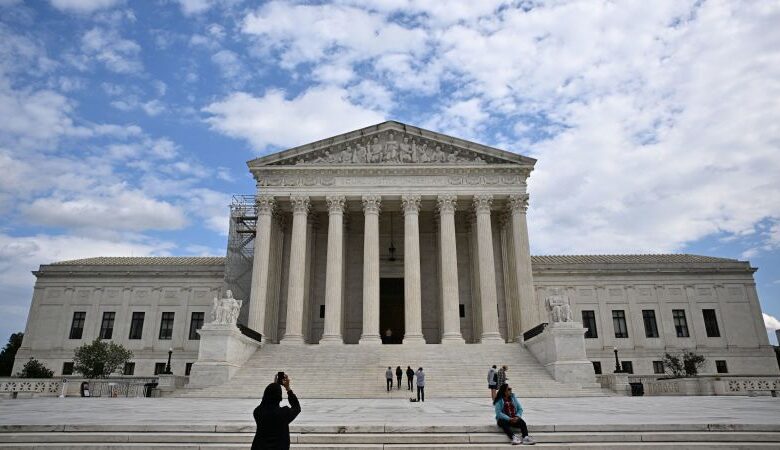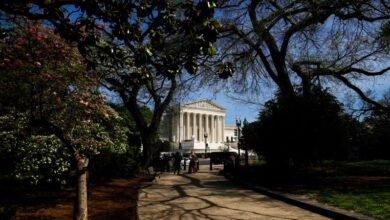Supreme Court to examine the power of agencies and the president

The Supreme Court returns to the so-called “administrative state” Wednesday, in a case that offers the conservative majority a fresh chance to pare back the authority of regulatory agencies and could potentially enhance presidential power.
The case involves the reach of the Securities and Exchange Commission – established in 1934 to protect investors and maintain orderly markets – but it could also impact other federal agencies depending upon how the justices view the dispute.
It’s one of several cases this term where the conservatives on the court are expected to take a hard look at the structure of government out of a belief that independent agencies unaccountable to the public have become too powerful, in violation of the separation of powers.
One aspect of the case – that will be decided by July in the heat of the presidential election – concerns the tenure of administrative law judges who can only be removed for cause, and not at the whim of the president. It comes as former President Donald Trump has suggested if he were reelected that he would want the authority to fire anyone who he believed was not following his direction.
The justices will be reviewing the latest controversial opinion from the 5th US Circuit Court of Appeals – one of the most conservative appellate courts in the country that covers Louisiana, Mississippi and Texas – where conservative litigants often file suit hoping for eventual Supreme Court review.
On the other side of the divide are those who are fearful of undermining the government’s regulatory powers out of a belief that an agency, with its vast subject matter expertise, is best suited to tackle complex issues in areas such as financial regulation, the environment and workplace protections.
Central to Wednesday’s dispute are the in-house enforcement proceedings of the SEC that consist of administrative courts staffed with agency employees.
The SEC consists of five members appointed by the president and confirmed by the Senate. The commission can enforce a variety of federal statutes in two ways. It can institute administrative enforcement proceedings seeking civil penalties, or it may bring civil actions in federal court.
The case arose in 2013 after the SEC brought an enforcement action for securities fraud against George R. Jarkesy, who had established two hedge funds with his advisory firm, Patriot28. The funds brought in over 100 investors and held about $24 million in assets.
An SEC administrative law judge found Jarkesy had violated the Securities Act, Exchange Act and Advisers Act for fraud actions. He was ordered to pay a civil penalty of $300,000, and to repay nearly $685,000 in ill-gotten gains. Jarkesy was also barred from various securities industry activities including serving as an investment advisor.
Jarkesy, however, challenged the proceedings arguing they violated the Constitution, and won in the 5th Circuit.
The federal appeals court ruled in favor of Jarkesy on three separate constitutional claims. It held that certain of the SEC’s proceedings deprive individuals of their Seventh Amendment right to a civil jury. In addition, the court said that Congress had improperly delegated legislative power to the SEC which gave the agency unconstrained authority at times to choose the in-house administrative proceeding rather than filing suit in district court. The court emphasized that under precedent, Congress can only grant regulatory power to another entity if it provides an “intelligible principle” to guide the proceedings.
“The Constitution,” the court held, “provides strict rules to ensure that Congress exercises the legislative power in a way that comports with the People’s will.”
The conservative appellate court also said that rules allowing for the removal of SEC administrative law judges only for “good cause” – are unconstitutional because they insulate the judges from the presidents’ ability to remove them for any reason in violation of the separation of powers.
“The Fifth Circuit found three different constitutional problems with the SEC’s administrative enforcement powers, two of which – that Congress lacks the power to delegate this authority to the SEC in the first place and that these proceedings violate the Seventh Amendment – are not likely to sit well with a majority of the justices,” said Steve Vladeck, CNN Supreme Court analyst and professor at the University of Texas School of Law.
Vladeck says the issue of the independence of the administrative law judges who preside over the in house adjudications has long been of interest to conservative justices.
Some of them have signaled that it could be inconsistent with the so called “unitary executive” doctrine, which holds that anyone who carries out any executive branch power must be directly answerable to the president.
“Even if the Court leaves the rest of the SEC’s administrative enforcement power intact, holding that the Constitution forbids truly independent administrative law judges in the executive branch could have pernicious consequences down the road for the fairness and impartiality of everything from deportation proceedings to patent disputes,” Vladeck said.
A group of administrative law scholars in support of the SEC argued in a friend of the court brief that if the justices were to rule that the SEC’s proceedings violate the Seventh Amendment’s right to a trial by jury it would have a “devastating” impact on other agencies such as the Federal Trade Commission, Department of Labor and the National Labor Relations Board.
The 5th Circuit’s decision, their lawyer Alan Morrison argued, “was made without proper appreciation for the need for Congress to have flexibility when it seeks to solve important problems by making use of agency adjudication in today’s regulatory framework.”
Morrison also believes the lower court was wrong when it comes to the removal procedures applicable to the SEC administrative law judges.
As things stand the administrative judges can only be removed if they have done something glaringly wrong. The 5th Circuit essentially said the president should be able to fire them for any reason – or no reason.
“That is wrong,” Morrison said in an interview. “Nothing in the Constitution forbids Congress from assuring that administrative judges do not serve at the whim of their agency heads in order to protect the rights of those who appear before them.”
Lawyers for the Chamber of Commerce support Jarkesy and argue the case presents the court “with another opportunity to reaffirm the structural limitations of the Constitution,” noting that like other financial regulatory agencies the SEC is responsible for creating substantive rules and “levying knee-buckling penalties against private citizens.”
“The growth of the administrative state has eroded” safeguards, lawyer Steven A. Engel argued on behalf of the chamber.
Get Best News and Web Services here







